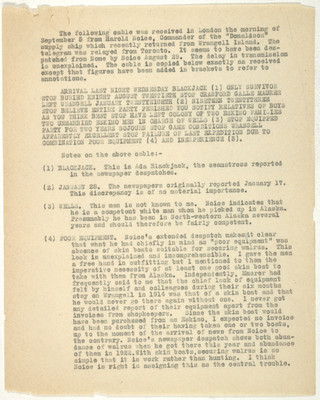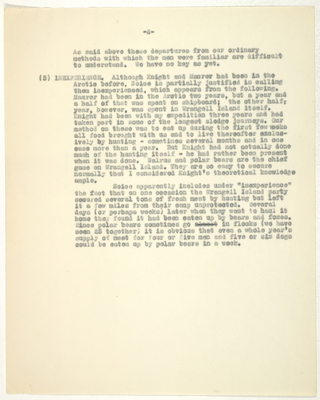Pages
stefansson-wrangel-09-21-025-001
The following cable was received in London the morning of from Harold Noice, Commander of the "Donaldson" supply ship which recently returned from Wrangell Island. The telegram was relayed from Toronto. It seems to have been despatched from Nome by Noice August 29. The delay in transmission is unexplained. The cable is copied below exactly as received except that figures have been added in brackets to refer to annotations.
ARRIVAL LAST NIGHT WEDNESDAY BLACKJACK (1) ONLY SURVIVOR STOP BURIED KNIGHT AUGUST TWENTIETH STOP CRAWFORD GALLE MAURER LEFT WRANGELL JANUARY TWENTYEIGHTH (2) NINETEEN TWENTYTHREE STOP BELIEVE ENTIRE PARTY PERISHED YOU NOTIFY RELATIVES OF BOYS AS YOU THINK BEST STOP HAVE LEFT COLONY OF TWO ESKIMO FAMILIES TWO UNMARRIED ESKIMO MEN IN CHARGE OF WELLS (3) STOP EQUIPPED PARTY FOR TWO YEARS SOJOURN STOP FULL GAME CONDITIONS WRANGELL APPARENTLY EXCELLENT STOP FAILURE OF LAST EXPEDITION DUE TO COMBINATION POOR EQUIPMENT (4) AND INEXPERIENCE (5).
Notes on the above cable:-
(1) BLACKJACK. This is Ada Blackjack, the seamstress reported in the newspaper despatches.
(2) JANUARY 28. The newspapers originally reported January 17. This discrepancy is of no material importance.
(3) WELLS. This man is not known to me. Noice indicates that he is a competent white man whom he picked up in Alaska. Presumably he has been in North-western Alaska several years and should therefore be fairly competent.
(4) POOR EQUIPMENT. Noice's extended despatch makes it clear that what he had chiefly in mind as "poor equipment" was absence of skin boats suitable for securing walrus. This lack is unexplained and incomprehensible. I gave the men a free hand in outfitting but I mentioned to them the imperative necessity of at least one good skin boat to take with them from Alaska. Independently, Maurer had frequently said to me that the chief lack of equipment felt by himself and colleagues during their six months stay on Wrangell in 1914 was that of a skin boat and that he would never go there again without one. I never got any detailed report of their equipment apart from the invoices from shopkeepers. Since the skin boat would have been purchased from an Eskimo, I expected no invoice and had no doubt of their having taken one or two boats, up to the moment of the arrival of news from Noice to the contrary. Noice's newspaper despatch shows both abundance of walrus when he got there this year and abundance of them in 1922. With skin boats, securing walrus is so simple that it is work rather than hunting. I think Noice is right in assigning this as the central trouble.
stefansson-wrangel-09-21-025-002
-2-
As said above these departures from our ordinary methods with which the men were familiar are difficult to understand. We have no key as yet.
(5) INEXPERIENCE. Although Knight and Maurer had been in the Arctic before, Noice is partially justified in calling them inexperienced, which appears from the following. Maurer had been in the Arctic two years, but a year and a half of that was spent on shipboard; the other halfyear, however, was spent in Wrangell Island itself. Knight had been with my expedition three years and had taken part in some of the longest sledge journeys. Our method on these was to eat up during the first few weeks all food brought with us and to live thereafter exclusively by hunting - sometimes several months and in one case more than a year. But Knight had not actually done much of the hunting itself - he had rather been present when it was done. Walrus and polar bears are the chief game on Wrangell Island. They are so easy to secure normally that I considered Knight's theoretical knowledge ample.
Noice apparently includes under "inexperience" the fact that on one occasion the Wrangell Island party secured several tons of fresh meat by hunting but left it a few miles from their camp unprotected. Several days (or perhaps weeks) later when they went to haul it home they found it had been eaten up by bears and foxes. Since polar bears sometimes go almost in flocks (we have seen 25 together) it is obvious that even a whole year's supply of meat for four or five men and five or six dogs could be eaten up by polar bears in a week.

